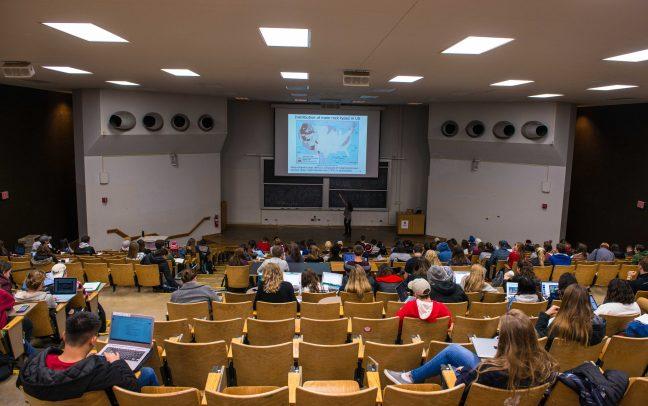Which of the following countries is the U.S. bound by treaty to protect if they are attacked: Sweden, Turkey, Bosnia, or Mexico?
Which of the following countries has a Muslim majority population: India, Armenia, South Africa or Indonesia?
The answers are Turkey and Indonesia, but don’t worry — if you guessed incorrectly, you’re not alone. In fact, according to a 2016 National Geographic survey on global literacy in the U.S., those questions were answered correctly by just 14 percent and 29 percent of Americans, respectively.
Granted, those are tough questions. The U.S. has defense pacts with around 55 different countries, so it’s not unreasonable for the average American to forget a few of those from time to time.
But, this survey presented a troubling trend. In collaboration with the Council on Foreign Relations, National Geographic surveyed 1,203 Americans aged 18-26-years-old who had recently attended an American two or four-year university or college, in a series of 75 different questions about global politics and geography. The survey found that the total percent of correct responses from all respondents was just 55 percent. And yet, 86 percent of respondents said they consider themselves at or above average in terms of knowledge about global affairs.
I have spent the fall semester studying at Trinity College in Dublin, Ireland, and I spent the summer at Nankai University in Tianjin, China. My experience with students from countries outside of the U.S. has been this: They all know as much about U.S. politics as I do, but they know way more about the politics of their own country, and the countries around them than I do.
This has been particularly noticeable in Europe — students from one EU country all seem to have a respectable level of political literacy about all major countries in the EU, and various other countries around the world.
In my Irish history class, my classmates can all seamlessly draw historical and political comparisons amongst a variety of different countries, while I was struggling to just keep up with what is going on in Ireland, and maybe draw some connections to the U.S., once in a while.
Part of this difference is certainly tied to geography — in terms of land size, the U.S. is about the same size as all of Europe, so one could argue that for a French person to be familiar with German politics is similar to a Minnesotan familiar with Wisconsin politics.
But that doesn’t address European familiarity with U.S. politics, despite Americans’ lack of reciprocal understanding. Again, some of this can be explained. In an interview with Vice, Simon Tate, author of “A Special Relationship? British Foreign Policy in the Era of American Hegemony” explained to a certain extent, much of the world does currently have a vested interested in U.S. politics — we saw this trend during the Cold War era, too.
“There’s something about U.S. politics at the moment which makes it weirdly hypnotic, even if you aren’t that interested in politics,” Tate said. “In part, it’s the expectation of waiting for Trump’s next gaffe, outrageous comment, or revelation — like when you get a bad contestant on The X Factor or Britain’s Got Talent, you know it’s going to end in some sort of disaster, but you still want to watch it. And given the really important issues in Trump’s inbox, that’s a tragedy, really.”
In a Forbes article, George Friedman explains part of the difference lies in how citizens view the role of the government. “In many European countries, the state is at the center of many of the activities that shape private life, but that is less true in the United States,” Friedman said. “The American public is often most active in public affairs when resisting the state’s attempts to increase its presence, as we saw with health care reform.”
But ultimately, the difference lies in education. Take a look at foreign languages, for example. In Europe, all countries except Ireland and Scotland have federal mandates requiring students to learn at least one foreign language. Many European countries require students to learn at least two foreign languages, with foreign language education starting as early as three years old.
The U.S., on the other hand, has no regulations about compulsory foreign language education, and as a result, only 20 percent of K-12 students are enrolled in a foreign language class. Global understanding is certainly difficult to achieve for those who speak one language — even if that language is English.
This pattern continues well into college. Most European colleges have course offerings in U.S. politics, history, government and culture. American universities, on the other hand, tend to feature more generalized options, such as Asian studies and European studies.
At the risk of sounding overly Ameri-centric, America’s influence on the rest of the world is unavoidable and undeniable. But the rest of the world’s influence on the U.S. is undeniable, too. So stop denying it.
Take a class about another country’s history or politics. Enroll in a foreign language course. Investigate opportunities in studying abroad. Understanding the cultural and political contexts of other countries is vital to American politics and culture, but also recognize that foreign politics insofar as they relate to American politics barely scratches the surface.
Cait Gibbons (cgibbons@badgerherald.com) is junior majoring in math and Chinese.


